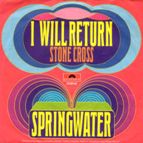In this day and age, few instrumental hits get heard on the thousands of radio stations that exist. Even acts like the Shadows, who arguably are the most successful instrumental act, with their 31 UK hits, you might only very occasionally hear one or their tracks. During the sixties, the instrumental was commonplace which naturally followed on from the days before the charts where people bought sheet music and made their own. Once we hit the seventies, the instrumental suddenly became quite rare. In 1971, however, an act called Springwater spent three months on the chart with the track I Will Return, but how many people reading this can remember the name of it, let alone whistle it?
Springwater was the alias of one Phil Cordell. Phil left school in 1963, and promptly joined a local Enfield band, called Steve Douglas and the Challengers. Apart from Steve, they consisted of Phil on guitar, Mick Ware on rhythm guitar, Geoff Hawkins on bass and Derek Gough on drums. After a short stint in Germany Hawkins left and was replaced by Freddie Fields and they changed their name to The Prophets. They recorded a couple of tracks with Joe Meek at his Holloway studio but they were never released. In 1965 Douglas and Fields both left and so Phil took charge and brought in bassist Paul Kendrick and formed a new band called Tuesdays Children and made regular appearances at all the well known London clubs including the Marquee. They recorded a track called Strange Light from the East and to maximize their publicity they featured on the front cover of Fab 208 wearing Chinese outfits.
Success wasn’t forthcoming so in 1967, Phil left the band for a solo career. Two years later he recorded Red Lady under his own name, a song full of the drug references you would expect from that era. Phil had learned many instruments and played everything on the track, including the harp. It was released on the Warner Brothers in the UK and on the Janus label in America.
The following year he moved from London to Eastbourne where he bought a run-down house which he intended doing up. After a few months he discovered that this house had a basement and when he went down there he came across an active well. This inspired the non de plume Springwater which he used to record his next track. In between doing up his house in which he also built a studio, he recorded music again with him playing all the instruments.
The first track, in 1971, was called I Will Return, which many at the time speculated was a reference to the sixties and how he hoped musically the world would return to that decade. It was an instrumental which became a surprise hit. It reached number five in the UK, number three in Germany and topped the chart in Switzerland. It may well have been Joe Meek inspired as it was as anthemic as Telstar but obviously much less remembered.
By 1974, Phil had left Springwater behind and took another pseudonym, Dan The Banjo Man. He recorded a self titled album, and the single of the same name reached number one in German twice following its use in an orange juice advert on German television. After these successes, Phil reverted back to his own name and continued recording tracks such as: One Man Show, Doin’ The Best I Can, Londonderry and Back In Your Arms. He also recorded for the Motown-owned label, Mowest.
Phil continued to have a large following in Europe and Japan. In 2005 Dan the Banjo Man was reissued on CD and had eight bonus tracks, most of them written and recorded by Phil and his son Charlie. It also included a 2005 remake of Dan the Banjo Man and a 1985 vocal re-recording of I Will Return. Into the 2000s he used to hired out his home studio to up and coming musicians and help them in their quest of making big in the music industry.
Phil died on March 31st 2007 at the age of just 59. He left a daughter Kaz by his first wife, daughter Claire and son Charlie from his second wife Christine who died in 2003.
